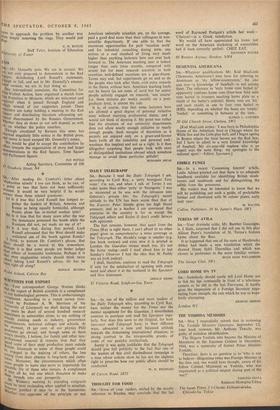-. ENTISTS FOR EXPORT SIR -..._ te Your correspondent George Watson thinks
at the export of British scientists is a compliment our technological prowess. This is embarrassingly crnIPacent. According to a recent survey (con- ueted b Professor A. W. Merrison of the Univ ersdY of Liverpool) we shall during the- next 'e Years be short of several hundred research supervisors in universities alone, to say nothing of e readY existing needs in industry, government rstablishments, technical colleges and schools. At
ne Moment, 18 per cent. of our physics PhD grad
-uates go abroad, and though some of them return (mostly, I believe, for family and other non- s''rofessional reasons) it remains true that they le;,11d some of their most productive years outside b,1"airl. Inasmuch as some of these people could ar..ellgaged in the training of others, the loss laitio8 from their absence is long-term and cumu- ea„tve. Moreover, the circumstances which often sc"se People to leave also serve to impoverish the lealific life of those who remain. A compliment de e rnaY all be, but one which threatens to make 13 inroads into our prosperity.
could Watson's warning to intending emigrants ho Id be most misleading when applied to scientists, ,I.Ciever justified it may be in the humanities. "'tether one approves of the principle or not,
American university scientists are, on the average, paid a good deal more than their colleagues in non- scientific departments. If one adds to that the enormous opportunities for paid 'vacation work' and for industrial consulting during term, one arrives at a real standard of living very much higher than anything lecturers here can ever look forward to. The American teaching year is indeed longer than ours (nine months, compared with seven) but for most research scientists in both countries well-defined vacations are a pipe-dream. Terms may end, but experiments go on and so do the people who look after them, with extra rewards in the States, without here. American teaching loads can be heavy (as are some of ours) but for senior people actively engaged on research, 'one course' (i.e. three lectures per week), usually on a post- graduate level, is almost the rule.
It is, of course, true that some lecturers here are allowed a great degree of personal initiative even' without enjoying professorial status, and I would not think of denying it. My point was rather that the structure of our university departments does not allow nearly enough initiative to nearly enough people. Such margins of discretion as it permits are enjoyed only on a grace-and-favour basis (with all the instability and personal awk- wardness this implies) and not as a right. Is it then altogether surprising that people look with envy at distinguished institutions abroad which somehow manage to avoid these particular pitfalls?
BENJAMIN SPEAR














































 Previous page
Previous page